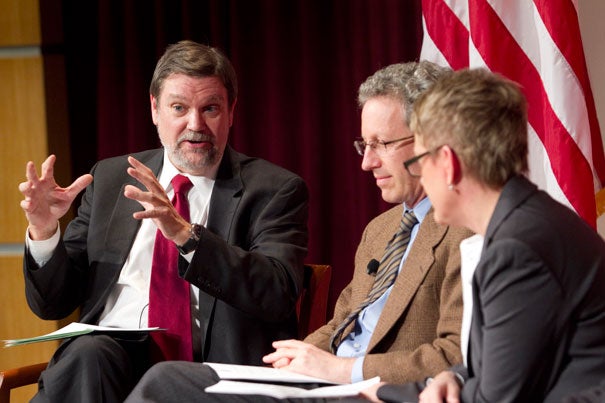
Harvard Kennedy School Dean David T. Ellwood (left) moderated a panel discussion at the Kennedy School Forum titled discuss “The Growing Challenge of Inequality.” Among the participants was professors Lawrence F. Katz (center) and Kathy Edin.
Jon Chase/Harvard Staff Photographer
Dealing with inequality
Panel suggests options, but doubts there’s the political will to adopt them
Asking the simplest question amid a sea of statistics about income gaps and metaphors about rising tides and economic ladders, Harvard Kennedy School Dean David T. Ellwood stumped a session that was called to discuss “The Growing Challenge of Inequality.”
“What are we going to do about it?” Ellwood asked at the John F. Kennedy Jr. Forum on Thursday. Suppose, he said, a member of Occupy Wall Street came into the session and said, “ ‘I want to change inequality in America.’ What should we do?”
A moment of silence greeted the question, and then William Julius Wilson, the Lewis P. and Linda L. Geyser University Professor, took the plunge.
“The question is: What can we do realistically, given the present economic and political [reality],” he said. “I would love to strengthen the nation’s equalizing institutions … institutions that I think played major roles in the broadly rising economics in all groups.”
That includes quality public schools, minimal wage, and health care legislation, he said.
Wilson sounded a theme that was repeated through the discussion: that the period of 1947 through 1970 was a time of great equalization in income level, when it seemed that a rising tide did lift all boats. Unions were stronger, tax structures were different, and “there was a regular increase in the minimum wage,” Wilson said.
Lawrence F. Katz, the Elisabeth Allison Professor of Economics, cited numerous statistics that underscored recent changes in the U.S. economic structure. “Any way you slice or dice data on income or earning, you’ve seen large inequalities of income in the last 30 years.”
The share of national income going to the upper 1 percent more than doubled from 1979 from about 10 percent to about 23.5 percent, he said.
“To put it in perspective: If magically, we could have kept a share of the top 1 percent income from where it was in 1979 and redistribute to all the incomes of the bottom 90 percent, everyone would have $9,000 more, or 27 percent higher income.”
Katz painted a picture of the widening gaps, saying that if you think of the economy as an apartment house, the penthouse is now more sumptuous, and the basement has been flooded and is full of cockroaches. What is more telling is that the elevator is not working, he said, impeding the ability of people to move up a floor, and the people at the top rarely move down.
Where a person is born and where he or she starts out is now a much bigger determinant of where he or she will end up than in recent decades, he said. Deregulation, tax cuts, and high executive compensation have all played a role in this, he said.
Pressed by Ellwood as to what is the norm of executive compensation, Katz noted that corporations are now larger, and decisions that are only 1 percent better may make a huge difference in billion-dollar companies.
Still, Katz said, huge incentives may not be needed for motivating good management: “Making $10 million more rather than $20 million more, you still try to make a good decision.”
Painting an ominous portrait of how family life is affected by economic inequality, Kathy Edin, professor of public policy and management, noted that the higher proportion of unstable and complicated family life (divorces, remarriages, mixed families) among lower-income groups may have “far-reaching and negative implications for kids’ well-being, especially for boys.” The divorce rate among people with upper-level income is now about that of the 1960s, whereas divorce rates are growing among lower levels.
“When you talk to unmarried parents at the hospital, they definitely want to stay together and raise their children together. What happens economically to them over the first five years of their child’s life matters a lot,” Edin said. “If you follow couples over time, you find that when they make even modest economic gain, their chances of marriage, and staying together, and raising their children together increase substantially.”
If education is a key to improving the economic status of the poor, the very system of funding public education by each city or town, which creates great disparities, has to change, said Edward Glaeser, the Fred and Eleanor Glimp Professor of Economics. He sounded a cynical note, by referring to American ethnic fragmentation and insular political institutions. “That combination is still very much in place,” he said.
But even if public education were to be magically transformed overnight, it would be 20 years before the youngest student would enter the job market, Ellwood said. “Can we wait 20 years?” he asked.
Tellingly, Ellwood also observed that panelists’ comments had “not focused on the top 1 percent, except as a source of revenue. You worked on a set of problems that were more at the bottom half.”
Wilson praised the Occupy Wall Street movement for raising the public awareness of inequality. Addressing that, however, the panelists acknowledged, is more difficult.




